Politics
EXCLUSIVE: Pelosi reflects on long career, LGBTQ advocacy
Former Speaker credits activists who fought for AIDS funding, marriage equality
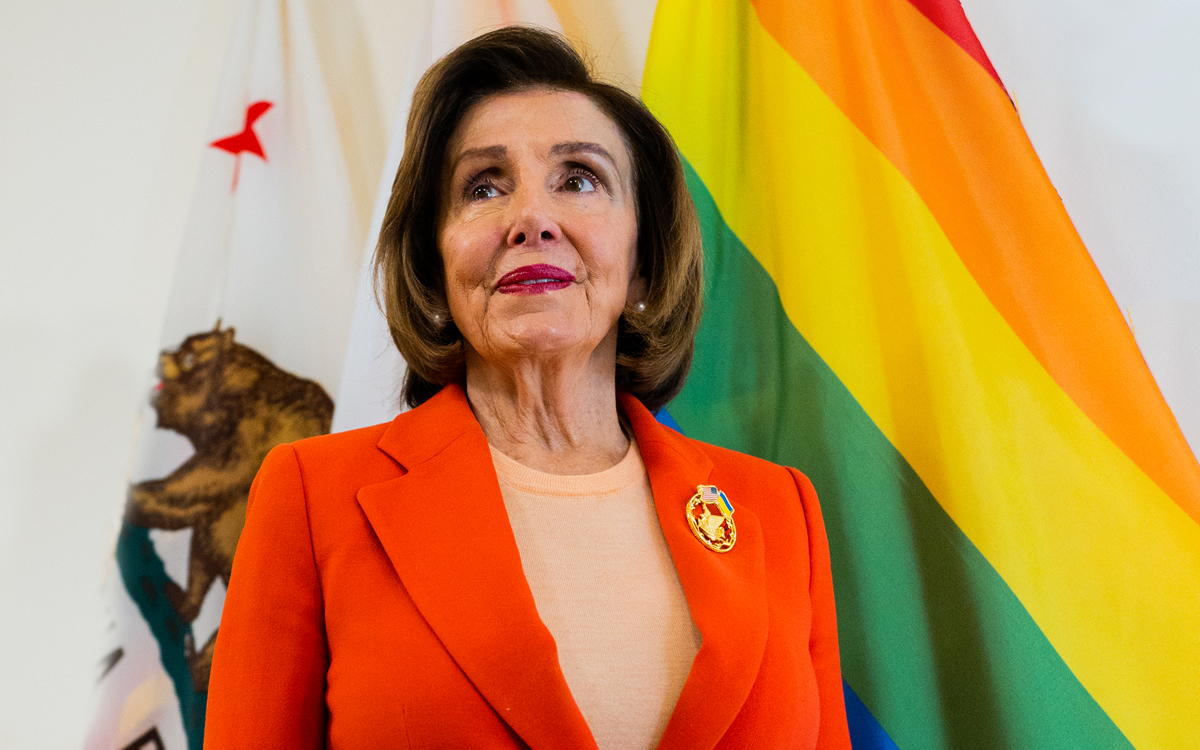
Rep. Nancy Pelosi (D-Calif.) sat down with the Washington Blade in her office Tuesday evening for an exclusive interview just weeks after formally stepping down from leadership, having led her party in the House for 20 years, including as Speaker.
Pelosi reflected on the role she has played in landmark legislative achievements, including milestones in the fight for LGBTQ rights. She also addressed some current events that have earned significant attention from political observers and the beltway press.
So much of the historic progress over the past few decades in advancements toward the legal, social, and political equality of LGBTQ Americans, including those living with HIV/AIDS, was facilitated directly or otherwise supported by Pelosi’s leadership in Congress, but she was quick to credit the tireless work of individual activists and LGBTQ, civil rights, and HIV/AIDS advocacy groups.
“I attribute the success with [fighting] HIV/AIDS and everything that came after,” from legislation on hate crimes to marriage equality, “to the outside mobilization” of these activists and organizations, she told the Blade.
Despite positioning herself as an advocate for LGBTQ rights well before that position was popular, Pelosi said she is unaware of any instances where she may have suffered political consequences as a result. Regardless, she said, “I don’t care.”
The more she has been criticized for championing LGBTQ rights in Congress, “the more proud I am” of that work, Pelosi added.
Pelosi has always been a strident LGBTQ ally, guided by her commitment to justice, love, and fairness as ordained by the teachings of her Catholic faith. These ideals are in perfect alignment, she said, as opposed to the position held by many opponents of LGBTQ rights who nevertheless claim to believe we are all created in God’s image.
During an interview with Larry King, when serving as the San Francisco Democratic National Convention host committee chairwoman in 1984, Pelosi said the late television host remarked: “I just don’t understand how a Catholic girl who grew up in Baltimore, Maryland is such a champion for gay rights.”
“You’ve answered your own question,” Pelosi told him, referring to his mention of her Catholicism. “It is our faith that tells us that we’re all God’s children, and we must respect the dignity and worth of every person.”
Pelosi’s time in Congress began with the AIDS crisis, and she has kept up the fight ever since
After committing herself and the Congress to the fight against HIV/AIDS during her first speech from the floor of the House in 1987, Pelosi said some of her colleagues asked whether she thought it wise for her feelings on the subject to be “the first thing that people know about you” as a newly elected member.
They questioned her decision not because they harbored any stigma, but rather for concern over how “others might view my service here,” Pelosi said. The battle against HIV/AIDS, she told them, “is why I came here.”
“It was every single day,” she said.
Alongside the “big money for research, treatment, and prevention” were other significant legislative accomplishments, such as “when we] were able to get Medicaid to treat HIV [patients] as Medicaid-eligible” rather than requiring them to wait until their disease had progressed to full-blown AIDS to qualify for coverage, said Pelosi, who authored the legislation.
“That was a very big deal for two reasons,” she said. First, because it saved lives by allowing low-income Americans living with HIV to begin treatment before the condition becomes life-threatening, and second, because “it was the recognition that we had this responsibility to intervene early.”
Other milestones in which Pelosi had a hand include the Housing Opportunities for People with AIDS program, President Bush’s PEPFAR (President’s Emergency Plan For AIDS Relief) initiative, the Affordable Care Act (which contains significant benefits for Americans living with HIV/AIDS), and funding for the Ending the Epidemic initiative.
The last appropriations bill passed under Pelosi’s tenure as Democratic leader in December contained an additional $100 million boost to HIV/AIDS programs.
These and other hard-won victories over the years – from the biomedical progress made possible by investment in research to foreign aid packages that have saved countless lives overseas – have often come despite staunch opposition from lawmakers, particularly congressional Republicans.
For instance, the late former Sen. Jesse Helms of North Carolina opposed federal funding for HIV/AIDS research because he considered it tantamount to the government’s endorsement of “the homosexual lifestyle” responsible for the spread of the disease in the U.S.
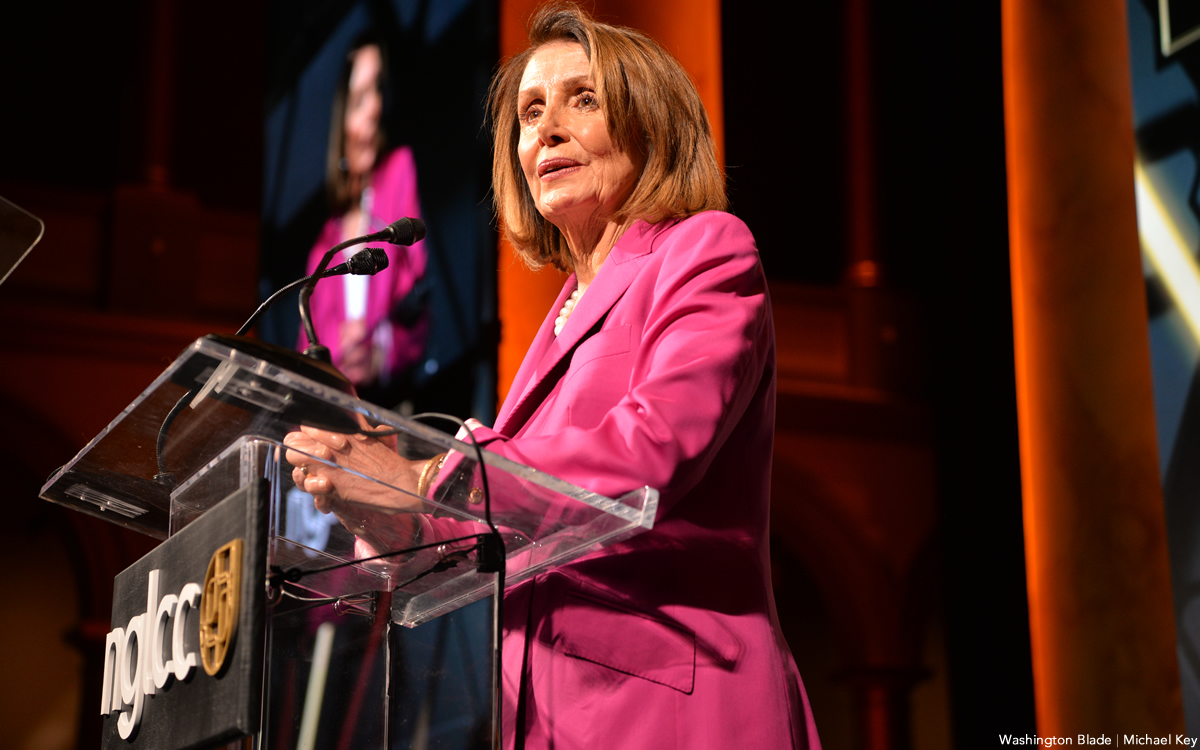
Asked how she might compare anti-LGBTQ members like Helms with whom she worked in the past to those serving today, Pelosi said the most salient difference is the homophobic and transphobic attitudes among lawmakers in previous decades were in many cases borne out of ignorance.
Pelosi said that while the prejudice was “horrible [back] then” and she was “impatient” with lawmakers in the House who exhibited attitudes similar to those expressed by Helms, at that time people who held those views were often “just not up to date on what was happening in the world.”
(Pelosi noted that, for his part, Helms seemed to soften his stance on matters concerning HIV/AIDS. She suspects U2 frontman Bono may have successfully appealed to Helms as a parent, but “I don’t know exactly.”)
By contrast, today’s lawmakers, like the overwhelming majority of Americans, “must have a growing awareness of [LGBTQ] people in their own communities, maybe in their own families,” Pelosi said. “They’re really in a different world,” which means, they “have made a decision that they’re going to be anti-LGBTQ,” she said, adding that hate and prejudice today is most often directed at the trans community. “It’s completely unacceptable.”
Asked to share her thoughts on the many scandals that have unfolded over the past couple of months concerning gay freshman GOP Rep. George Santos of New York, Pelosi pointed out that while the congressman has dominated headlines recently, other members of the House Republican caucus who have weaponized homophobia and transphobia to a far greater extent than he are much more dangerous.
But first, Pelosi said that House Democrats would never do what the Republican leadership has done by tolerating the embattled freshman congressman to protect their slim majority control of the chamber.
Santos is “almost a joke; he’s become a punch line,” Pelosi said. “He’s outrageous, and there’s no way he should be allowed to serve” given the extent to which the congressman has failed to exhibit the “dignity” required of members who are privileged to serve in the House of Representatives.
At the same time, “there are people over there who are more seriously dangerous to the freedoms in our country than him” Pelosi said. She pointed to the hate mongering and fear mongering in which many of Santos’s Republican colleagues have engaged, including “the things that that they say about trans families and, just, the injustice of it all.”

The aim of these far-right lawmakers extends far beyond undermining the rights of LGBTQ people, of course. Pelosi noted that, “you have to remember, with all of these things, whether we’re talking about women’s right to choose – we’ve always expanded freedoms. And now with this Supreme Court, they’re narrowing freedoms with women’s right to choose” by the revocation of constitutional protections for abortion via last year’s ruling in Dobbs v. Jackson Women’s Health Organization.
Breaking the ‘marble ceiling’
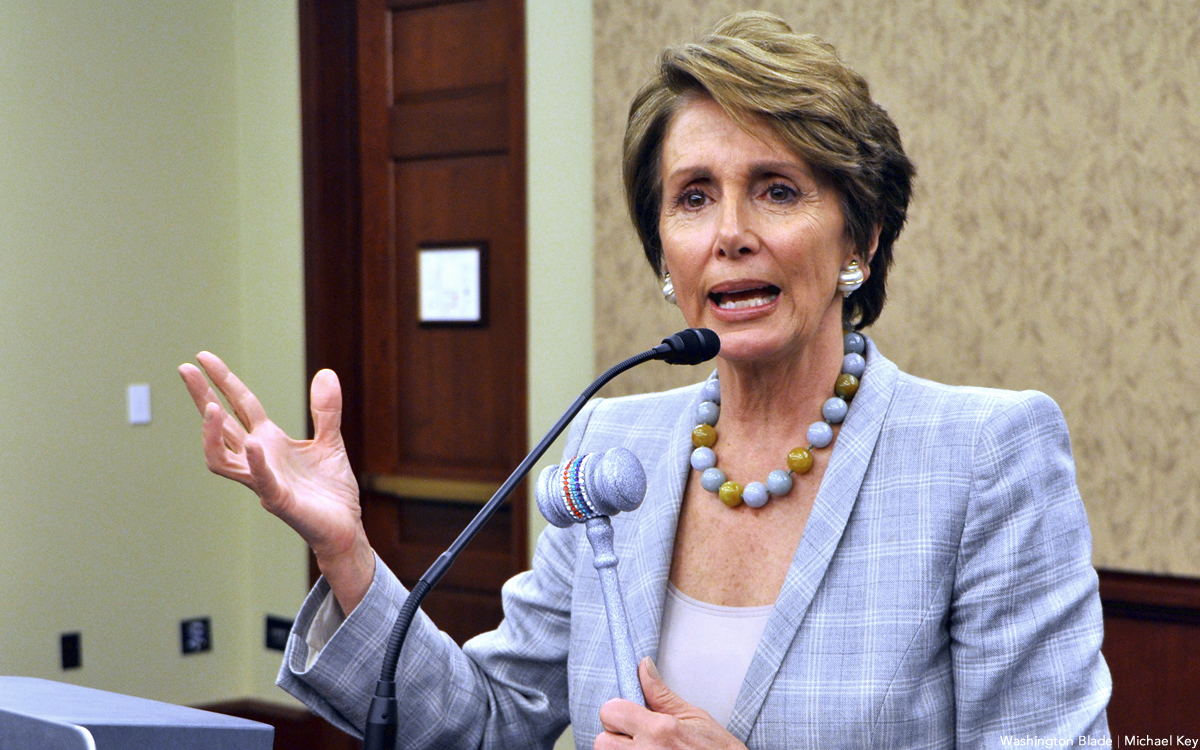
During a lecture last year hosted at the University of California, Berkeley, Barbara Boxer, who formerly represented California in the House and then in the Senate, commented on the historic significance of Pelosi’s election to become the first woman Speaker of the House of Representatives in 2006. “The fact that a woman could get into the leadership like this, to win the trust of all these men, it’s more extraordinary than you can imagine,” Boxer said.
Boxer has also been a trailblazer for women in politics. She was the first woman to chair the Marin County Board of Supervisors, and after her election to serve in the upper chamber alongside California’s senior Sen. Dianne Feinstein, the two became the first pair of women to represent any state in the U.S. Senate.
Asked how she managed to secure the votes from, particularly, the older men in her caucus without compromising her values, Pelosi told the Blade, “I just did what I believed” rather than coming to Congress to “change other people’s behavior.”
She said that many of her male colleagues “had to get over their own negative attitudes” concerning the prospect of electing a woman to lead their party in the House, but “I wasn’t going to wait until then.”
At the same time, Pelosi acknowledged that “it took courage to vote for a woman as speaker,” noting that when she was sworn in back in 2007, she took the opportunity to thank the men who had supported her speakership. (She was elected unanimously on the first ballot.)
Pelosi said that prior to her speakership, she had always believed that the prospect of Americans electing a woman president was likelier to happen in her lifetime than members of Congress – who tend to be older men – voting for a woman speaker.
“I thought the American people were more ready than the Congress” to break the “marble ceiling,” she said.
Considering the parallel special counsel investigations into alleged mishandling of classified documents by President Joe Biden and former President Donald Trump, Pelosi has perhaps unwittingly strengthened the case for America to elect a woman president by virtue of her unblemished record as a steward of sensitive, top-secret information.
“I have 30 years of experience in intelligence. I have been on the [House Intelligence] Committee, the top Democrat on the Committee, ex officio on the Committee, a speaker and [Democratic] leader [in the House],” Pelosi said.
She distinguished the rules by which she and other members of Congress are governed, which prohibit the removal or relocation of classified documents, from the policies that the Commander in Chief must follow, which are comparably more permissive.
Regardless, Pelosi said, “the documents are to be respected,” along with the rules and procedures for how they should be handled.
There are also important distinctions to note between the allegations against Trump and Biden, Pelosi said. “When you see the former president obstructing access to the documents, and you see this president saying, ‘I’ve instructed my lawyers to look for whatever is there and make them available to the Justice Department,’ that’s two different things,” she said.
Additionally, Pelosi said, from the information that has been made available so far, it seems that Trump was in possession of a greater volume of documents whose contents were more sensitive than those at issue in Biden’s case.
Pelosi’s LGBTQ fans celebrate her accomplishments
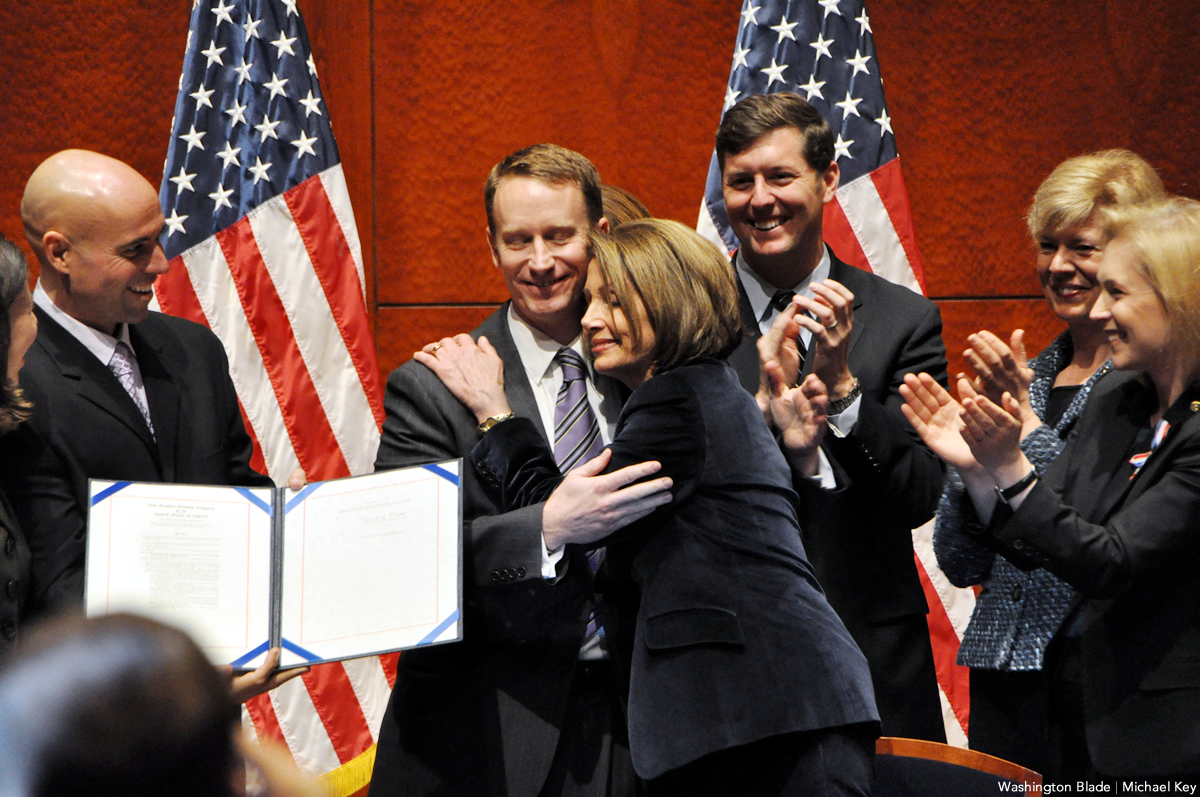
In November, the Human Rights Campaign, America’s largest LGBTQ advocacy organization, issued a statement following Pelosi’s announcement of her plans to step down from Democratic leadership but continue to represent her constituents in California’s 11th Congressional District in the House.
“Speaker Pelosi has been the tip of the spear on watershed advancements for the LGBTQ+ community,” HRC President Kelley Robinson said in a statement, pointing to her 1987 speech on the AIDS crisis and “forceful advocacy for marriage equality long before its mainstream popularity,” both before she was elected as speaker.
The Clinton-era Defense of Marriage Act, which banned federal recognition of same-sex marriages, was signed into law in 1996 with overwhelming support from both parties in both chambers of Congress; 342 members of the House voted for the proposal, with Pelosi joining only 64 other House Democrats, one independent, and one Republican in her opposition.
“During [Pelosi’s] tenure as Speaker,” HRC noted, “the House of Representatives passed an historic hate crimes law [the Matthew Shepard and James Byrd Jr. Hate Crimes Prevention Act], repealed the discriminatory ‘Don’t Ask, Don’t Tell’ law, led the fight to enact the Affordable Care Act, and vocally opposed bans on transgender members serving in our nation’s military.”
Pelosi’s leadership was bookended with Congress’s passage late last year of the Respect for Marriage Act, which is credited as the greatest legislative victory for LGBTQ Americans since the 2010 repeal of “Don’t Ask, Don’t Tell.”
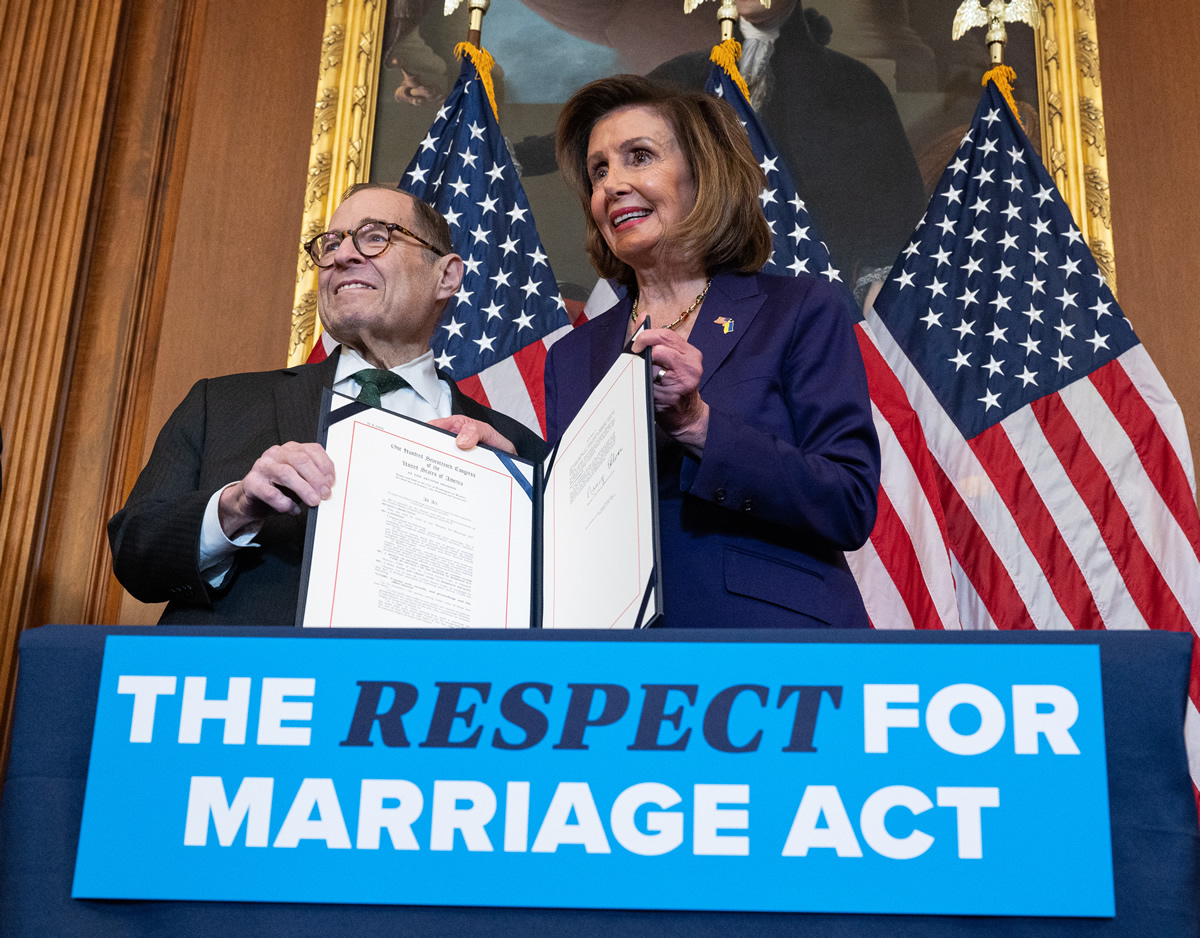
Outside the U.S. Capitol building, Pelosi has also been celebrated by the LGBTQ community for signaling her support through, for example, her participation in some of the earliest meetings of the NAMES Project AIDS Memorial Quilt, her meeting with the survivors of the 2016 Pulse nightclub massacre, and her appearance at a host of LGBTQ events over the years.
Of course, at the same time, Pelosi has been a constant target of attacks from the right, which in the past few years have become increasingly violent. During the siege of the Capitol on Jan. 6, 2021, her office was ransacked by insurrectionists who shouted violent threats against her. A couple of weeks later, unearthed social media posts by far-right Rep. Marjorie Taylor Greene (Ga.) revealed she had signaled support for executing Pelosi along with other prominent House Democrats. And last October, the speaker’s husband Paul Pelosi suffered critical injuries after he was attacked by a man wielding a hammer who had broken into the couple’s San Francisco home.
Pelosi told CNN last week that her husband is “doing OK,” but expects it will “take a little while for him to be back to normal.”
Among her fans in progressive circles, Pelosi – who has been a towering figure in American politics since the Bush administration – has become something of a cultural icon, as well. For instance, the image of her clapping after Trump’s State of the Union speech in 2019 has been emblazoned on coffee mugs.
“What is so funny about it,” Pelosi said, is rather than “that work [over] all these years as a legislator,” on matters including the “Affordable Care Act, millions of people getting health care, what we did over the years with HIV/AIDS in terms of legislation, this or that,” people instead have made much ado over her manner of clapping after Trump’s speech. And while the move was widely seen as antagonistic, Pelosi insisted, “it was not intended to be a negative thing.”
Regardless, she said, “it’s nice to have some fun about it, because you’re putting up with the criticism all the time – on issues, whether it’s about LGBTQ, or being a woman, or being from San Francisco, or whatever it is.”
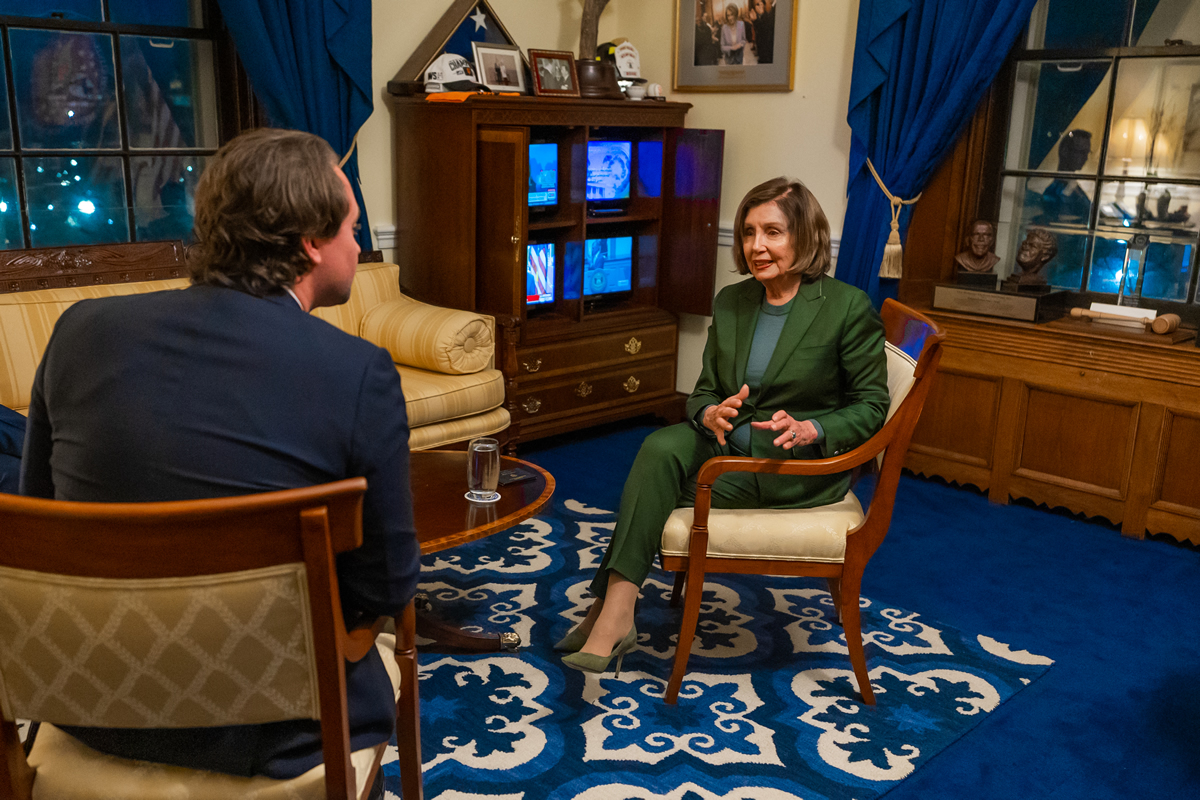
Congress
Senate parliamentarian orders removal of gender-affirming care ban from GOP reconciliation bill
GOP Senate Leader John Thune (S.D.) hoped to pass the bill by end-of-week

Restrictions on the use of federal funds for gender-affirming care will be stripped from the Republican-led Senate reconciliation bill, following a ruling by the Senate parliamentarian on Tuesday that struck down a number of health related provisions.
The legislation banned coverage for transgender medical care through Medicaid and the Children’s Health Insurance Program, language that was also included in the House version of the bill passed on May 22 with a vote of 215-214.
The parliamentarian’s decision also rejected Republican proposals for a Medicaid provider tax framework, which allows states to charge health care providers and use the funds to support their programs, along with broader cuts to Medicaid.
Amid calls to override Tuesday’s ruling from Republicans like U.S. Rep. Greg Steube (Fla.), GOP Senate Majority Leader John Thune (S.D.) told reporters “That would not be a good outcome for getting a bill done.”
He also acknowledged that the timing and schedule might have to be adjusted. Senate Republicans had hoped to pass the reconciliation bill by the end of this week, though this was not a legal or procedural deadline.
Dubbed the “one big, beautiful bill” by President Donald Trump, the legislation would extend tax breaks from 2017 that overwhelmingly benefit the wealthiest Americans and corporations. To cover the cost, which is estimated to exceed $4 trillion over 10 years, the bill would make drastic cuts to social welfare programs, particularly Medicaid.
Democrats are not in a position to negotiate across the aisle with Republicans holding majorities in both chambers of Congress, but for months they have been calling attention to the effort by their GOP colleagues to strip Americans of their health insurance to pay for the tax breaks.
The Congressional Budget Office estimates that 10.9 million people would lose their coverage, either through Medicaid or the Affordable Care Act marketplaces. Some Republicans like U.S. Sen. Josh Hawley (Mo.) are pushing back against the deep cuts to Medicaid, arguing they would be devastating for many of their constituents and also to hospitals, nursing homes, and community health care providers in rural areas.
In a statement emailed to the Washington Blade on Tuesday, U.S. Senate Democratic Whip Dick Durbin (Ill.) said, “Anti-trans extremists are attempting to use the full power of the government to hurt kids, and recent Supreme Court decisions in Skrmetti and Medina are enabling their quest.”
While today’s ruling by the Senate parliamentarian is a temporary win, I will keep pushing back on these shameful attempts to harm trans kids and their families for trying to live authentically,” said the senator, who also serves as ranking member of the powerful Senate Judiciary Committee.
U.S. Rep. Mark Takano (D-Calif.), who is gay and chairs the Congressional Equality Caucus, also shared a statement with the Washington Blade addressing the parliamentarian’s ruling:
“This ruling by the Senate Parliamentarian is a win for the transgender people who rely on Medicaid and CHIP to access the healthcare they need to live fuller, happier, and healthier lives—but the fight is not over yet,” the congressman said.
“Republican Senators must abide by her ruling and remove the ban from the final version of Trump’s Big Ugly Bill,” he said. “Yet, even with this provision removed, this bill is terrible for the American people, including trans Americans. Every Equality Caucus member voted against it in the House and we’re ready to do so again if the Senate sends it back to the House.”
The Human Rights Campaign issued a press release with a statement from the organization’s vice president for government affairs, David Stacy:
“The fact remains that this bill belongs in the trash. It continues to include devastating cuts to health care programs — including Medicaid — that would disproportionately harm the LGBTQ+ community, all so the already rich can receive huge tax cuts,” Stacy said.
“While it comes as a relief that the Senate parliamentarian concluded that one provision in the nightmarish reconciliation bill that would have denied essential, best practice health care to transgender adults does not belong, we aren’t done fighting,” he said. “With attacks on our community coming from many directions, including the Supreme Court, we will work to defeat this bill with everything we’ve got.”
Congress
Murkowski, Shaheen reintroduce Global Respect Act
Bill would sanction foreign nationals who commit anti-LGBTQ human rights abuses

U.S. Sens. Lisa Murkowski (R-Alaska) and Jeanne Shaheen (D-N.H.) on Wednesday once again introduced a bill that would sanction foreign nationals who carry out human rights abuses against LGBTQ and intersex people.
The two senators have previously introduced the Global Respect Act. Co-sponsors include U.S. Sens. Chris Van Hollen (D-Md.), Chris Murphy (D-Conn.), Jeff Merkley (D-Ore.), Cory Booker (D-N.J.), Peter Welch (D-Vt.), Brian Schatz (D-Hawaii), Edward Markey (D-Mass.), Tammy Baldwin (D-Wis.), and Ron Wyden (D-Ore.)
“Around the world, individuals who are part of the LGBTQ+ community are in danger for simply existing,” said Murkowski in a press release. “Hate and violence cannot and should not be tolerated. I’m hopeful that this legislation will establish actionable consequences for these inexcusable human rights violations, and create a safer world for all people — regardless of who they are or who they love.”
Shaheen in the press release notes “the risk of personal harm for LGBTQI individuals for publicly identifying who they are or expressing who they love has tragically increased in recent years.”
“Human rights, as defined by the Universal Declaration of Human rights, recognizes that global freedom, justice, and peace depend on ‘the inherent dignity’ and ‘the equal and inalienable rights of all members of the human family,” said the New Hampshire Democrat. “LBGTQI human rights are universal human rights. We must ensure that we hold all violators of those rights accountable.”
The promotion of LGBTQ and intersex rights abroad was a cornerstone of the Biden-Harris administration’s foreign policy.
The current White House has suspended most foreign aid. The elimination of these funds has left the global LGBTQ and intersex rights movement reeling.
Congress
Garcia elected top Democrat on the House Oversight Committee
Gay Calif. lawmaker vows to hold Trump-Vance administration accountable

U.S. Rep. Robert Garcia (D-Calif.) on Tuesday was elected top Democrat on the House Oversight Committee in a vote that signaled the conference’s overwhelming support for a newer voice on Capitol Hill who will play a key role taking on President Donald Trump.
With a margin of 150-63, the 47-year-old openly gay congressman defeated U.S. Rep. Stephen Lynch (D-Mass.), alongside U.S. Reps. Jasmine Crockett (D-Texas) and Kweisi Mfume (D-Md.) who exited the race after the House Democratic Steering and Policy Committee backed Garcia.
Serving only since 2023, the congressman has had a remarkably quick ascent leading up to his election this week as ranking member of one of the most powerful House committees, awarded a leadership position serving under House Democratic Whip Katherine Clark (Mass.) and selected as a co-chair of former Vice President Kamala Harris’s 2024 presidential campaign.
Democratic members began jockeying for the top seat on the oversight committee this spring after the late-U.S. Rep. Gerry Connolly of Virginia stepped away amid news that his esophageal cancer had returned. He died in May.
Connolly last year fended off a challenge from one of the most well known House Democrats, U.S. Rep. Alexandria Ocasio-Cortez (N.Y.), though with a narrower margin that signaled intra-party tensions over whether leadership roles should still be awarded based on seniority.
Garcia positioned himself as a bridge between the two camps — a consensus candidate with executive managerial experience as the former mayor of Long Beach, Calif. At the same time, particularly since the start of Trump’s second term, the congressman has emerged as one of the most outspoken critics of the new Republican regime.
In a statement on X Tuesday, Garcia thanked his colleagues and promised to “hold Donald Trump and his administration accountable.”
I'm honored to have been elected by @HouseDemocrats to serve as Ranking Member on @OversightDems.
— Congressman Robert Garcia (@RepRobertGarcia) June 24, 2025
We will hold Donald Trump and his Administration accountable for their corruption – and work to make our government more effective for the American people.
Let's get to work.
If Democrats win control of the House next year, the oversight committee will be able to exercise powers that are now available only to Republicans under the chair, U.S. Rep. James Comer (R-Ky.), which include the authority to investigate virtually any matter across the federal government, to issue subpoenas, and to compel testimony.
In the meantime, Garcia on Monday promised that Democrats on the committee would “vigorously fight” Republican Speaker Mike Johnson’s (La.) plans “to dismantle the Government Accountability Office.”
-

 U.S. Supreme Court3 days ago
U.S. Supreme Court3 days agoSupreme Court upholds ACA rule that makes PrEP, other preventative care free
-

 U.S. Supreme Court3 days ago
U.S. Supreme Court3 days agoSupreme Court rules parents must have option to opt children out of LGBTQ-specific lessons
-

 India5 days ago
India5 days agoIndian court rules a transgender woman is a woman
-

 National5 days ago
National5 days agoEvan Wolfson on the 10-year legacy of marriage equality










